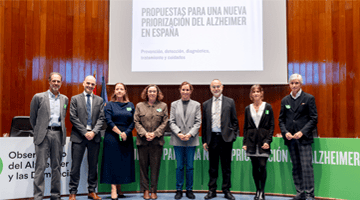
This document is essential to move towards a model for a comprehensive approach to Alzheimer's and other diseases.
Presentation of the report ‘Proposals for a new prioritisation of Alzheimer’s in Spain’ with experts in science, health and social rights
This document is essential to move towards a model for a comprehensive approach to Alzheimer's and other diseases.
Key organisations and experts from the scientific, health and social fields presented the report ‘Proposals for a new prioritisation of Alzheimer’s in Spain’ this Thursday at the Ministry of Health. The report was drawn up within the framework of the Alzheimer’s and Dementias Observatory, an initiative that we are promoting.
The document proposes preparing the National Health System to include new treatments to modify the course of Alzheimer’s disease, promote research into it with greater funding and incorporate dementias into the new care model. In addition, the report advocates improving early diagnosis through cognitive screening and biomarkers, as well as promoting prevention by focusing on modifiable risk factors.
The Minister of Health, Mónica García, opened the event by stressing that ‘Alzheimer’s is a challenge, a silent epidemic with a great social and socio-health impact on sufferers and their families. That is why I am grateful for the impetus that organisations such as yours bring us today, without them it is impossible to make policies that improve people’s lives’. She also reaffirmed her commitment ‘to better prevention of the disease. This does not give votes or headlines, because it is long term, but it is where we have to invest and we are committed to it’.
For his part, Dr. Arcadi Navarro, director of the Foundation, stressed that ‘in view of the great scientific, health and social challenge posed by these pathologies, it is necessary to open a new stage in our country to address their prevention, diagnosis, treatment and care. The World Health Organisation has declared dementia a public health priority and urges states to have policies, strategies, plans or national frameworks to address it. But Spain has made slow progress in implementing a specific national plan’.
Dr Navarro also referred in his speech to the recent approval by the EMA (European Medicines Agency) to market the first drug capable of slowing the progression of Alzheimer’s disease in its early stages, ‘it is crucial to accelerate the process of including lecanemab in Spain. This treatment can make a big difference for many patients in the early stages, improving the quality of life of those affected and their caregivers’.
In this regard, during the round table discussion with key experts, Dr. Pascual Sánchez Juan, representative of the Spanish Society of Neurology (SEN), stressed that ‘the application of these drugs is a challenge, forcing us to make a much more complex medicine, taking into account biomarkers, genetic data and calibrate the clinical picture of the patient. Therefore, the fear that this generates is that there may be differences between regions, discrimination by postcode, as not all of them have the technology or the experience to adapt to the paradigm shift that the implementation of these first drugs entails’.
Mariló Almagro, president of the Spanish Alzheimer’s Confederation (CEAFA), emphasised that, from a social perspective and with a focus on Alzheimer’s sufferers and their families: ‘We must not only take into account the person diagnosed, but also the caregivers. We must create policies adapted to them, the majority of whom are women, and train professionals in the social and healthcare system, so that they can treat each case of Alzheimer’s on an individual basis’.
In the closing session, María Rosa Martínez Rodríguez, Secretary of State for Social Rights, stated that ‘we need a new model of care that includes people with dementia, that promotes social change and is in line with human rights. This model should put the person at the centre and include the development of community services that allow care at home, transform residential centres with the active participation of families and make changes to the law on dependency’.
The document ‘Proposals for a new prioritisation of Alzheimer’s in Spain’ is the result of a process of analysis and debate in which representatives of more than 30 organisations and leading experts from the scientific, health and social fields took part. Last July we met to rethink priorities and strategies, promoting greater visibility and a multidisciplinary approach in the public agenda.
According to its conclusions, the urgency of prioritising Alzheimer’s and dementia in Spain lies in their growing health, social and economic impact. Faced with this challenge, it stresses the need to reactivate political and institutional commitment to implement a new action plan to build a new prioritisation of Alzheimer’s and dementia in Spain.
Download the document ‘Proposals for a new prioritisation of Alzheimer’s in Spain’ here.